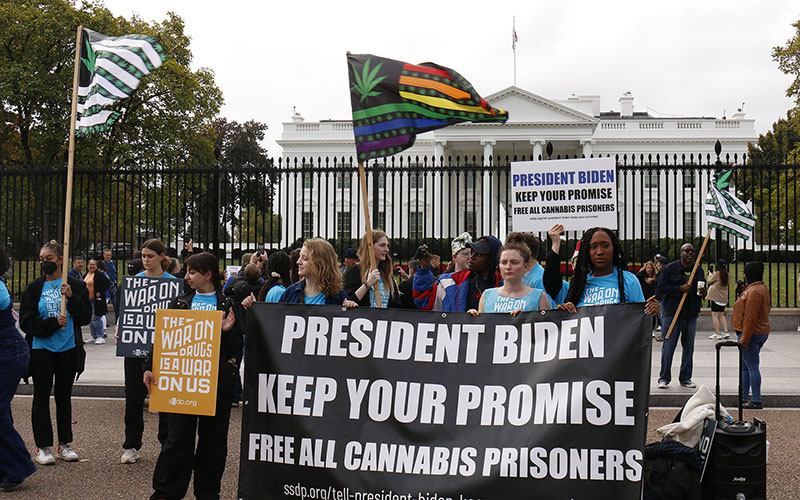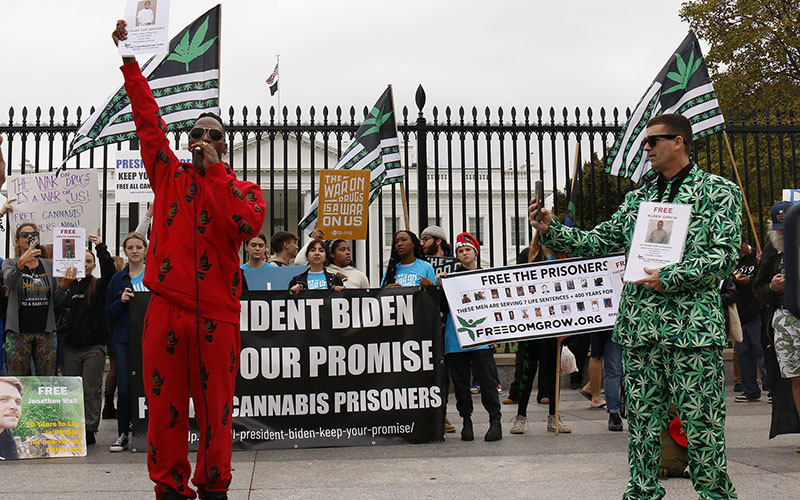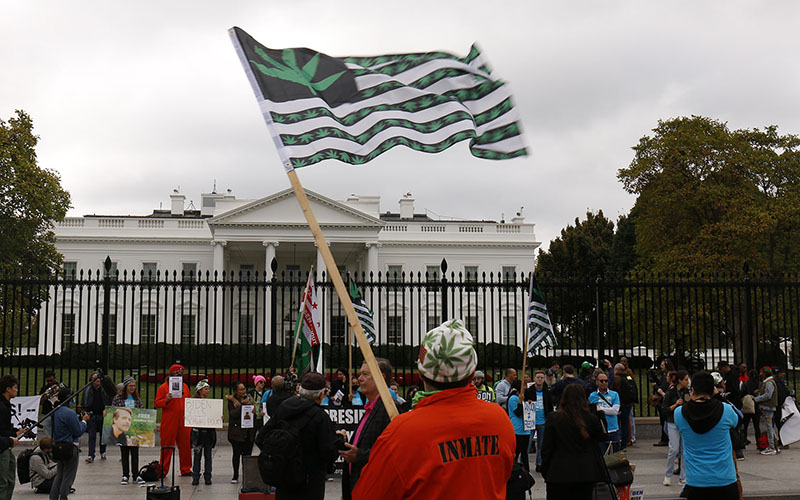
President Joe Biden said this month that he would pardon people convicted on a federal charge of marijuana possession, contingent on several other steps. Critics, noting that Biden campaigned on the issue, said it’s past time for action. (Photo by Tori Gantz/Cronkite News)

Hip-hop artist M1, in red, was among the protesters outside the White House Monday calling on President Joe Biden to make good on his promise to pardon people convicted of simple cannabis possession. (Photo by Tori Gantz/Cronkite News)

Among the groups calling for the Biden administration to move more quickly on the expungement of cannabis possession convictions were former inmates who had been convicted on the charge. (Photo by Tori Gantz/Cronkite News)
WASHINGTON – Students from across the country rallied outside the White House Monday to demand that President Joe Biden deliver on a campaign promise to release prisoners convicted of marijuana possession.
The protest came just weeks after the president unveiled a plan to pardon those with federal convictions for cannabis possession, and directed the departments of Justice and Health and Human Services to investigate the possibility of downgrading marijuana on the list of illegal drugs.
Maya Tatum, a Phoenix-based organizer of the White House protest, said it’s time for action from Biden, who campaigned on that commitment two years ago.
“The over complication of the expungement process allows for there to be a breakdown where no one actually gets the help that they need,” said Tatum, a 2013 Arizona State University graduate. “We need our families’ and friends’ records expunged. We need them out of prison. And that’s the bottom line.”
She was among the scores of activists at the White House Monday, including formerly incarcerated members of the Last Prisoner Project, family members of cannabis prisoners, local “marijuana justice” advocates and hip-hop stars Redman and M1 of Dead Prez, to urge action.
Biden on Oct. 6 said he would pardon anyone with a federal conviction for simple possession of marijuana, as long as they have no other convictions – a pardon that could apply to as many as 1,400 people in Arizona.
In making the announcement, the White House said that cannabis convictions impose needless barriers to employment, housing, and educational opportunities. “While white and Black and brown people use marijuana at similar rates, Black and brown people have been arrested, prosecuted, and convicted at disproportionate rates,” the statement said.
The White House estimates that as many as 6,500 Americans have a single possession conviction that could make them eligible for such a pardon.
Recent data from the U.S. Sentencing Commission showed that 1,451 federal offenders in Arizona had been convicted of cannabis possession – although that number also includes some people with more than one conviction or a conviction for possessing more than one drug. That was second only to the 1,559 people convicted on similar charges in California, according to the Sentencing Commission.
But the Biden pardons are contingent on the Justice Department developing a process for people to apply, and then reviewing those applications for “certificates of pardon … as soon as reasonably practicable.”
That was not soon enough for Monday’s protesters, who continuously looped a Nov. 21, 2019, recording of Biden stressing the importance of cannabis prisoners’ release.
“Number one, I think we need to decriminalize marijuana. Period,” Biden said in that clip. “And, I think anyone who has a record should be let out of jail, records expunged. Completely zeroed out.”
In response to a request for comment on the protest, an administration official reiterated the president’s commitment to expunging records and pointed to the announcement from earlier this month.
“President Biden has said since his campaign days, no one should be in jail just for using or possessing marijuana,” a White House spokeswoman said. “Sending people to prison for possessing marijuana has upended too many lives and incarcerated people for conduct that many states no longer prohibit.”
As part of that announcement of federal pardons, Biden also called on governors to do the same for people convicted of state offenses.
Arizona voters already made that call in 2020, when they approved Proposition 207, legalizing the adult recreational use of cannabis. That ballot measure also called for the state-level convictions for possession of small amounts of marijuana to be expunged.
But critics say those expungements have been delayed by a similarly difficult process under which people who were convicted are required to apply for that relief with the court.
“It definitely needs to be refined. It definitely needs to be better. It is failing people,” Tatum, who is active in the group Students for Sensible Drug Policy, said of the state program.
“They have failed us because they continue to create these arbitrary rules and then not stick to them, similar how Joe Biden put out a pardon that would release people with simple possession,” Tatum said. “It’s actually not releasing anyone. That is the same exact thing that’s happening in Arizona.”
– Cronkite News reporter Ryan Knappenberger contributed to this report.


